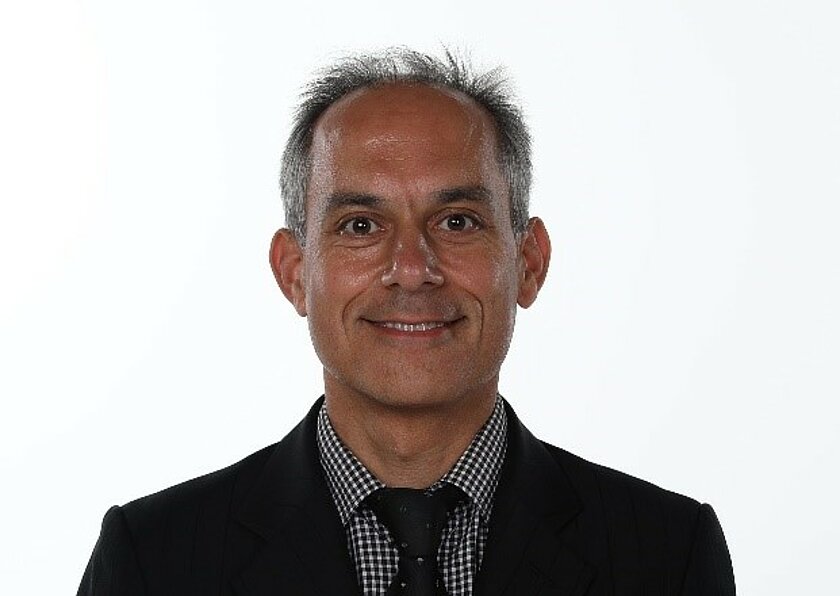The interlocutors
Patrick Da-Cruz is Professor of Business Administration and Healthcare Management at the Faculty of Healthcare Management at Neu-Ulm University of Applied Sciences (HNU) and Scientific Director of the MBA program Leadership and Management in Healthcare.
Before joining HNU, Mr. Da-Cruz worked for well-known strategy consultancies in the pharmaceutical / healthcare sector as well as in management positions in companies in the healthcare industry in Germany and abroad.

Andreas Burkhardt is General Manager of Teva Germany and Austria. In this position, he is responsible, among other things, for the drug brand ratiopharm, which has been part of the Israeli pharmaceutical company since 2010. Prior to his appointment as General Manager, he held various executive positions at Teva for more than 15 years, most recently as Managing Director of the Generics Division. Andreas Burkhardt is also Chairman of the Board of proGenerika, the association of generics and biosimilar companies in Germany. He launched the local initiative Donautal Connect at Teva's Ulm site, which represents the interests of companies in the Donautal industrial area.
![[Translate to English:] Porträtfoto von Andreas Burkhardt](/fileadmin/_processed_/8/a/csm_Andreas_Burkhardt_03_45_Variante_8bf5bf7d06.jpg)
What is the current relevance of the issue of supply bottlenecks in drug supply?
Andreas Burkhardt: Supply bottlenecks are still a key issue - unfortunately. Patients are still faced with empty shelves in pharmacies and urgently needed medicines are not available. And we're not just talking about painkillers and nasal sprays, but also antibiotics and drugs for cancer therapy. So we are dealing with a comprehensive problem that affects almost all areas.
What consequences do the shortages have for patient care?
Andreas Burkhardt: The security of supply of medicines is increasingly on shaky ground, and time and again various preparations are simply not available. For patients who are dependent on a drug, this is of course a catastrophe. For us as a producer, too, because our claim and our task is precisely that: to provide people with the medicines they need. In addition, supply bottlenecks are of course also the worst case from an economic point of view.
What do you see as the central causes of the bottlenecks?
Andreas Burkhardt: Unfortunately, there is not one cog you can turn. The problem is multi-layered; various aspects play a role. These include global supply chain problems and procurement problems for active ingredients and excipients alike. Skills shortages and staff absences also play a role. In combination with short-term fluctuations in demand, for example because a manufacturer goes out of business or the flu season is unusually long, this can then quickly lead to supply bottlenecks. The existing pricing policy in Germany further exacerbates the situation. Various instruments, such as rebate contracts, push the price down further and further - until production becomes almost a loss-making business and more and more manufacturers drop out. The entire supply then has to be shouldered by a few producers, as in the case of paracetamol juice. No one can keep this up for long.
In this context, what do you think of the recently passed Act to Combat Shortages in the Supply of Pharmaceuticals and Improve Supply (ALBVVG)?
Andreas Burkhardt: Basically, I am glad that politicians have finally recognized the problem and want to take countermeasures; we have been fighting for this for years. However, the measures that have been passed will not solve the problems. The whole system is not healthy and therefore more determination and consistency is needed. In concrete terms, this means that adjusting the price system for only a very few, selected drugs is not expedient. The mandatory six-month stockpiling further fuels the shortages instead of filling the shelves in pharmacies. The law therefore falls far short and will not prevent pharmaceutical companies from continuing to withdraw from the supply.
How do you see the future of Germany as a pharmaceutical location?
Andreas Burkhardt: At present, Germany is not very attractive as a production location for many manufacturers and is not always the first choice, especially for cost reasons. The price pressure in the industry is enormous. If we want to be in a position again in Germany to ensure a nationwide supply of all important medicines, politicians must react immediately and adapt the framework conditions. Local production could also be supported by concrete commitments, with politicians guaranteeing certain purchase quantities. In the short and medium term, the remaining production sites must be strengthened.
Thank you very much for the interview!






